最新常见不及物动词及搭配
常见不及物动词搭配

一、接不定式(而不接动名词)作宾语的24 个常用动词afford to do sth. 负担得起做某事 agree to do sth.同意做某事 arrange to do sth. 安排做某事 ask todo sth.要求做某事 beg to do sth.请求做某事 care to do sth.想要做某事 choose to do sth.决定做某事 decide to do sth.决定做某事 demand to do sth.要求做某事 determine to do sth.决心做某事 expect to do sth.期待做某事 fear to do sth.害怕做某事 help to do sth.帮助做某事 hope to do sth.希望做某事 learn to do sth.学习做某事 manage to do sth.设法做某事 offer to do sth.主动提出做某事plantodosth.计划做某事 preparetodosth.准备做某事 pretendtodosth. 假装做某事 promise to do sth.答应做某事 refuse to do sth.拒绝做某事 want to do sth.想要做某事 wish to dosth.希望做某事注:有些不及物动词后习惯上也接不定式,不接动名词:aim to do sth.打算做某事 fail to do sth.未能做某事 long to do sth.渴望做某事happen to do sth.碰巧做某事 hesitate to do sth.犹豫做某事 struggle to do sth.努力做某事跟介词搭配的不及物动词count on 依靠 embark on 上路 gamble on 以,, 打赌 insist on 坚持 ,,rely on 依靠 theorize on 对,, 推理,对 ,, 建立理论 harp on 老提到 ,,calculate on 指望,依靠concentrate on 集中到 ,,depend on 依靠 reckon on 盼望,指望 ,,account for 说明,解释 ,,answer for 回答 ,,apologize for 为,, 道歉 suffer for 为 ,, 受苦 pay for 为 ,, 付钱 look for 寻找 atone for 补偿,赔偿 make up for 补偿 stand for 代表及物动词与不及物动词 :在英语中按动词后可否直接跟宾语,可以把动词分成两种:及物动词与不及物动词。
常见不及物动词归纳
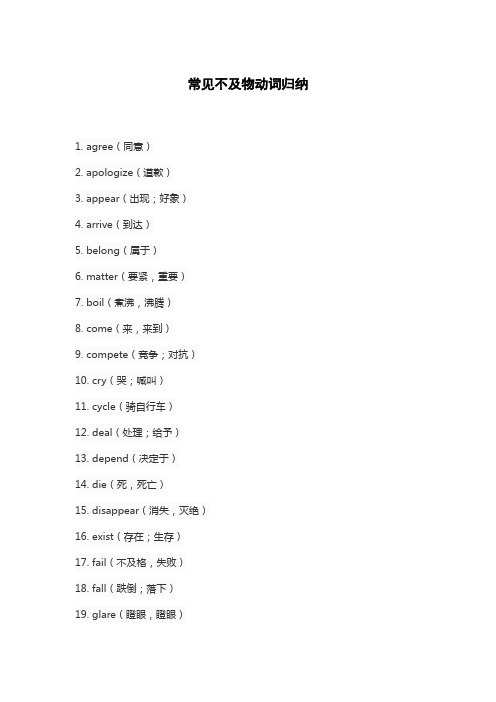
常见不及物动词归纳1. agree(同意)2. apologize(道歉)3. appear(出现;好象)4. arrive(到达)5. belong(属于)6. matter(要紧,重要)7. boil(煮沸,沸腾)8. come(来,来到)9. compete(竞争;对抗)10. cry(哭;喊叫)11. cycle(骑自行车)12. deal(处理;给予)13. depend(决定于)14. die(死,死亡)15. disappear(消失,灭绝)16. exist(存在;生存)17. fail(不及格,失败)18. fall(跌倒;落下)19. glare(瞪眼,瞪眼)20. go(去,走)21. graduate(毕业)22. happen(发生,出现)23. hesitate(踌躇,犹豫)24. hurry(匆忙)25. laugh(笑,大笑)26. lie(躺,平躺)27. listen(注意地听)28. live(居住,生活)29. look(看)30. move(搬家;移动)31. object(反对)32. occur(发生)33. rain(下雨)34. rest(休息;其余的)35. rise(上升,起床)36. run(跑)37. sail(航行,起航)38. settle(定居)39. sit(坐)40. skate(溜冰,滑冰)41. sleep(睡觉)42. smile(微笑)43. snow(下雪)44. stand(站立,位于)45. stare(凝视,盯着看)46. stay(呆,停留)47. succeed(成功)48. swim(游泳)49. talk(谈话)50. travel(旅行)51. wait(等,等待)52. walk(步行,散步)。
常见不及物动词及搭配
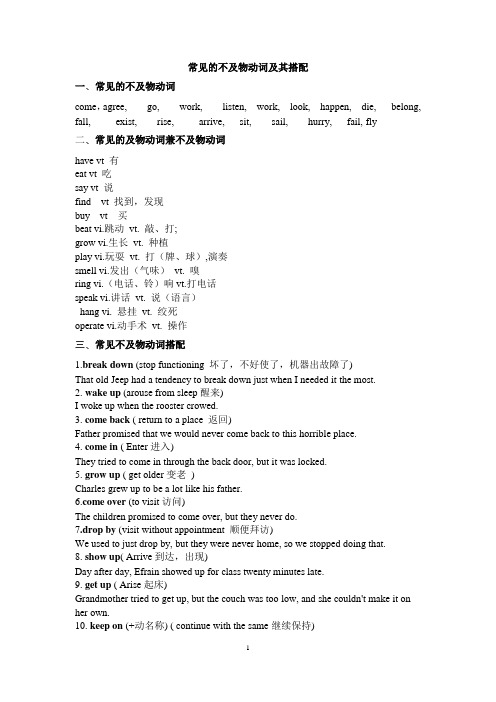
常见的不及物动词及其搭配一、常见的不及物动词come,agree, go, work, listen, work, look, happen, die, belong, fall, exist, rise, arrive, sit, sail, hurry, fail, fly二、常见的及物动词兼不及物动词have vt 有eat vt 吃say vt 说find vt 找到,发现buy vt 买beat vi.跳动vt. 敲、打;grow vi.生长vt. 种植play vi.玩耍vt. 打(牌、球),演奏smell vi.发出(气味)vt. 嗅ring vi.(电话、铃)响vt.打电话speak vi.讲话vt. 说(语言)hang vi. 悬挂vt. 绞死operate vi.动手术vt. 操作三、常见不及物动词搭配1.break down (stop functioning 坏了,不好使了,机器出故障了)That old Jeep had a tendency to break down just when I needed it the most.2. wake up (arouse from sleep醒来)I woke up when the rooster crowed.3. come back ( return to a place 返回)Father promised that we would never come back to this horrible place.4. come in ( Enter进入)They tried to come in through the back door, but it was locked.5. grow up ( get older变老)Charles grew up to be a lot like his father.e over (to visit访问)The children promised to come over, but they never do.7.drop by (visit without appointment 顺便拜访)We used to just drop by, but they were never home, so we stopped doing that.8. show up( Arrive到达,出现)Day after day, Efrain showed up for class twenty minutes late.9. get up ( Arise起床)Grandmother tried to get up, but the couch was too low, and she couldn't make it on her own.10. keep on (+动名称) ( continue with the same继续保持)He tried to keep on singing long after his voice was ruined.11. come to ( regain consciousness恢复意识)He was hit on the head very hard, but after several minutes, he started to come to again.12.go on ( Continue继续)He would finish one Dickens novel and then just go on to the next.13. go on (2) ( Happen发生)The cops heard all the noise and stopped to see what was going on.14. keep away from ( remain at a distance保持距离)The judge warned the stalker to keep away from his victim's home.四、跟介词搭配的不及物动词count on 依靠insist on坚持……rely on依靠calculate on 指望,依靠concentrate on 集中到……depend on依靠account for 说明,解释……apologize for为……道歉suffer for为……受苦pay for 为……付钱look for 寻找make up for补偿stand for代表compensate for 补偿refrain from抑制,忍住suffer from 受苦,患病benefit from 获益于escape from 从……逃开approve of 同意consist of 由……组成deal/cope with 处理reckon on盼望,指望……despair of 失望dream of 梦想做某事believe in 相信……persevere in 坚持……succeed in 在某方面成功delight in 为……高兴join in 加入……participate in 参加……persist in 坚持……specialize in 专门从事某事,在某方面专长aim at 瞄准于……laugh at 嘲笑smile at向……微笑work at 从事于……,用功于……look at 看着……object to 反对……react to 对某事作出反应respond to 对某事作出回应refer to 提到……turn to 转向……。
10个不及物动词例子大全
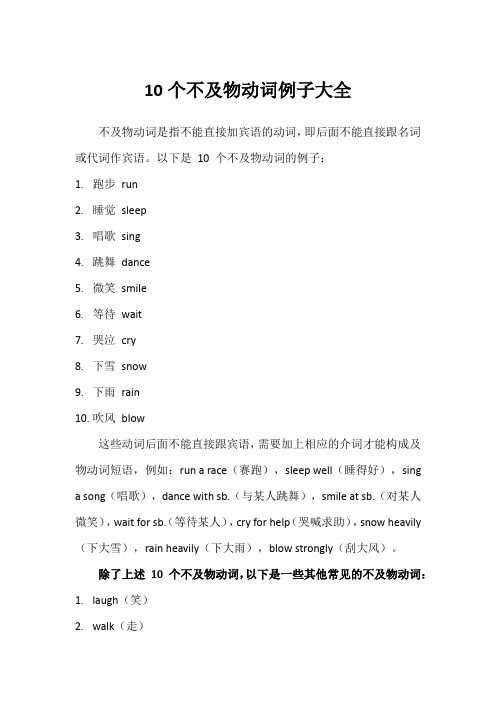
10个不及物动词例子大全
不及物动词是指不能直接加宾语的动词,即后面不能直接跟名词或代词作宾语。
以下是10 个不及物动词的例子:
1.跑步run
2.睡觉sleep
3.唱歌sing
4.跳舞dance
5.微笑smile
6.等待wait
7.哭泣cry
8.下雪snow
9.下雨rain
10.吹风blow
这些动词后面不能直接跟宾语,需要加上相应的介词才能构成及物动词短语,例如:run a race(赛跑),sleep well(睡得好),sing a song(唱歌),dance with sb.(与某人跳舞),smile at sb.(对某人微笑),wait for sb.(等待某人),cry for help(哭喊求助),snow heavily (下大雪),rain heavily(下大雨),blow strongly(刮大风)。
除了上述10 个不及物动词,以下是一些其他常见的不及物动词:
ugh(笑)
2.walk(走)
3.swim(游泳)
4.talk(说话)
5.think(思考)
6.hope(希望)
7.dream(梦想)
8.work(工作)
9.study(学习)
10.live(生活)
这些动词都不能直接跟宾语,需要加上适当的介词或副词才能构成及物动词短语。
例如,talk to/with sb.(与某人交谈),think about sth.(思考某事),hope for sth.(希望某事),dream of sth.(梦想某事),work on sth.(从事某事),study for sth.(为某事学习),live in sp.(住在某地)。
汉语常见的40个不及物动词
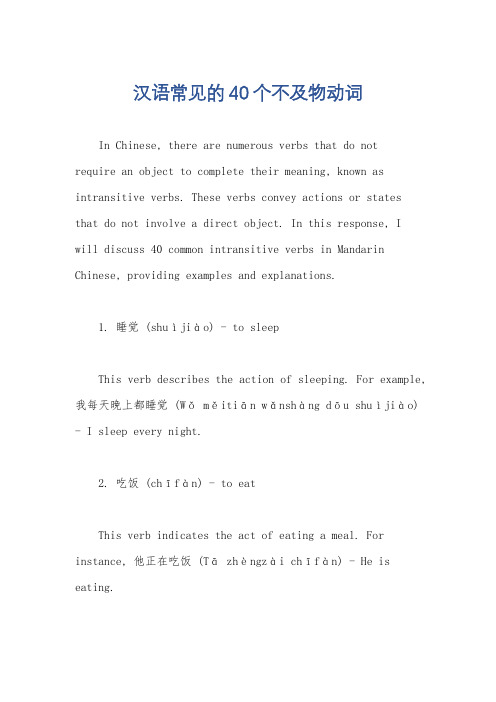
汉语常见的40个不及物动词In Chinese, there are numerous verbs that do notrequire an object to complete their meaning, known as intransitive verbs. These verbs convey actions or statesthat do not involve a direct object. In this response, Iwill discuss 40 common intransitive verbs in Mandarin Chinese, providing examples and explanations.1. 睡觉(shuìjiào) - to sleepThis verb describes the action of sleeping. For example, 我每天晚上都睡觉(Wǒ měitiān wǎnshàng dōu shuìjiào) - I sleep every night.2. 吃饭(chīfàn) - to eatThis verb indicates the act of eating a meal. For instance, 他正在吃饭(Tā zhèngzài chīfàn) - He is eating.3. 喝水(hēshuǐ) - to drink waterThis verb signifies the action of drinking water. An example sentence would be 我渴了,想喝水(Wǒ kěle, xiǎng hēshuǐ) - I'm thirsty, I want to drink water.4. 走路(zǒulù) - to walkThis verb describes the activity of walking. For example, 我每天早上都走路去上班(Wǒ měitiān zǎoshangdōu zǒulù qù shàngbān) - I walk to work every morning.5. 跑步(pǎobù) - to runThis verb indicates the action of running. For instance, 他每天都去公园跑步(Tā měitiān dōu qù gōngyuánpǎobù) - He goes to the park to run every day.6. 坐(zuò) - to sitThis verb signifies the act of sitting. An example sentence would be 她喜欢坐在窗边看书(Tā xǐhuān zuòzài chuāngbiān kànshū) - She likes to sit by the window and read.7. 站(zhàn) - to standThis verb describes the state of standing. For example, 他站在门口等我(Tā zhàn zài ménkǒu děng wǒ) - He is standing at the door waiting for me.8. 游泳(yóuyǒng) - to swimThis verb indicates the action of swimming. For instance, 夏天的时候我喜欢去海边游泳(Xiàtiān de shíhou wǒ xǐhuān qù hǎibiān yóuyǒng) - I like to swim at the beach in the summer.9. 跳舞(tiàowǔ) - to danceThis verb signifies the act of dancing. An example sentence would be 她在生日派对上跳舞(Tā zài shēngrìpàiduì shàng tiàowǔ) - She is dancing at the birthday party.10. 笑(xiào) - to laughThis verb describes the action of laughing. For example, 她听到笑话后哈哈大笑(Tā tīngdào xiàohuà hòu hāhādàxiào) - She laughed heartily after hearing the joke.11. 哭(kū) - to cryThis verb indicates the action of crying. For instance, 孩子受伤了,开始哭了起来(Háizi shòushāngle, kāishǐkūle qǐlai) - The child got hurt and started crying.12. 看(kàn) - to lookThis verb signifies the act of looking. An example sentence would be 我正在看电影(Wǒ zhèngzài kàndiànyǐng) - I am watching a movie.13. 听(tīng) - to listenThis verb describes the action of listening. Forexample, 我喜欢听音乐(Wǒ xǐhuān tīng yīnyuè) - Ilike to listen to music.14. 说话(shuōhuà) - to speakThis verb indicates the action of speaking. For instance, 他正在和朋友说话(Tā zhèngzài hé péngyoushuōhuà) - He is speaking with his friend.15. 唱歌(chànggē) - to singThis verb signifies the act of singing. An example sentence would be 她在音乐会上唱歌(Tā zài yīnyuèhuìshàng chànggē) - She sings at the concert.16. 学习(xuéxí) - to studyThis verb describes the action of studying. For example, 我每天晚上都在家学习(Wǒ měitiān wǎnshàng dōu zàijiā xuéxí) - I study at home every evening.17. 工作(gōngzuò) - to workThis verb indicates the action of working. For instance, 我每天早上九点开始工作(Wǒ měitiān zǎoshang jiǔ diǎnkāishǐ gōngzuò) - I start working at 9 am every morning.18. 着急(zháojí) - to worryThis verb signifies the state of being worried. An example sentence would be 她为考试着急(Tā wèi kǎoshìzháojí) - She is worried about the exam.19. 高兴(gāoxìng) - to be happyThis verb describes the state of being happy. For example, 我听到好消息感到很高兴(Wǒ tīngdào hǎo xiāoxi gǎndào hěn gāoxìng) - I feel very happy after hearing the good news.20. 生气(shēngqì) - to get angryThis verb indicates the state of getting angry. For instance, 他因为被误解而生气(Tā yīnwèi bèi wùjiě érshēngqì) - He got angry because he was misunderstood.21. 累(lèi) - to be tiredThis verb signifies the state of being tired. An example sentence would be 我工作了一整天,感觉很累(Wǒgōngzuòle yī zhěngtiān, gǎnjué hěn lèi) - I worked the whole day and feel very tired.22. 饿(è) - to be hungryThis verb describes the state of being hungry. For example, 我还没吃午饭,现在很饿(Wǒ hái méi chī wǔfàn, xiànzài hěn è) - I haven't had lunch yet, and now I'm hungry.23. 渴(kě) - to be thirstyThis verb indicates the state of being thirsty. For instance, 我喝了很多水,但还是很渴(Wǒ hēle hěn duōshuǐ, dàn háishì hěn kě) - I drank a lot of water,but I'm still thirsty.24. 冷(lěng) - to be coldThis verb signifies the state of being cold. An example sentence would be 外面下雪了,感觉很冷(Wàimiànxiàxuěle, gǎnjué hěn lěng) - It's snowing outside,and it feels very cold.25. 热(rè) - to be hotThis verb describes the state of being hot. For example, 夏天的时候天气很热(Xiàtiān de shíhou tiānqì hěn rè) - It's hot in summer.26. 忙(máng) - to be busyThis verb indicates the state of being busy. For instance, 我这几天工作很忙(Wǒ zhè jǐ tiān gōngzuòhěn máng) - I have been busy with work these days.27. 懒(lǎn) - to be lazyThis verb signifies the state of being lazy. An example sentence would be 他总是不愿意做家务,太懒了(Tā zǒngshì bù yuànyì zuò jiāwù, tài lǎnle) - He is always unwilling to do housework, so lazy.28. 担心(dānxīn) - to worryThis verb describes the action of worrying. For example, 她担心孩子的安全(Tā dānxīn háizi de ānquán) - She worries about her child's safety.29. 害怕(hàipà) - to be afraidThis verb indicates the state of being afraid. For instance, 我害怕黑暗(Wǒ hàipà hēi'àn) - I'm afraid of the dark.30. 惊讶(jīngyà) - to be surprisedThis verb signifies the state of being surprised. An example sentence would be 他听到这个消息非常惊讶(Tātīngdào zhège xiāoxi fēicháng jīngyà) - He was verysurprised to hear this news.31. 骄傲(jiāo'ào) - to be proudThis verb describes the state of being proud. For example, 她对自己的成绩感到很骄傲(Tā duì zìjǐ dechéngjī gǎndào hěn jiāo'ào) - She feels very proud of her achievements.32. 羡慕(xiànmù) - to be enviousThis verb indicates the state of being envious. For instance, 我羡慕他的才华(Wǒ xiànmù tā de cáihuá) - I envy his talent.33. 喜欢(xǐhuān) - to likeThis verb signifies the state of liking something. An example sentence would be 我喜欢看电影(Wǒ xǐhuān kàn diànyǐng) - I like watching movies.34. 讨厌(tǎoyàn) - to dislikeThis verb describes the state of disliking something. For example, 我讨厌吃辣的食物(Wǒ tǎoyàn chī là deshíwù) - I dislike eating spicy food.35. 爱(ài) - to loveThis verb indicates the state of loving something or someone. For instance, 我爱我的家人(Wǒ ài wǒ dejiārén) - I love my family.36. 需要(xūyào) - to needThis verb signifies the action of needing something. An example sentence would be 我需要你的帮助(Wǒ xūyào nǐ de bāngzhù) - I need your help.37. 想(xiǎng) - to wantThis verb describes the desire to have or do something. For example, 我想吃冰淇淋(Wǒ xiǎng chī bīngqílín) - I want to eat ice cream.38. 希望(xīwàng) - to hopeThis verb indicates the action of hoping for something. For instance, 我希望明天天气好(Wǒ xīwàng míngtiāntiānqì hǎo) - I hope the weather is good tomorrow.39. 相信(xiāngxìn) - to believeThis verb signifies the action of believing in something. An example sentence would be 我相信他会成功(Wǒ xiāngxìn tā huì chénggōng) - I believe he will succeed.40. 怀念(huáiniàn) - to missThis verb describes the action of missing someone or something. For example, 我怀念小时候的玩伴(Wǒ huáiniàn xiǎoshíhòu de wánbàn) - I miss my childhood playmates.These 40 intransitive verbs cover a wide range of actions, states, and emotions in Mandarin Chinese.Mastering these verbs will enhance your ability to express yourself in various situations and engage in meaningful conversations.。
英语常见的不及物动词
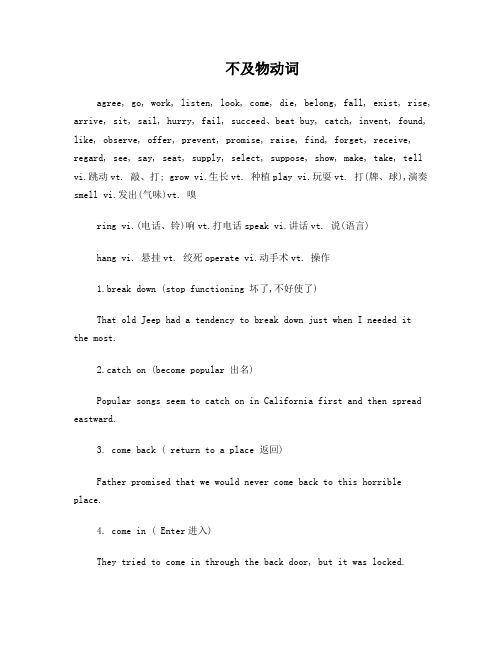
不及物动词agree, go, work, listen, look, come, die, belong, fall, exist, rise, arrive, sit, sail, hurry, fail, succeed、beat buy, catch, invent, found, like, observe, offer, prevent, promise, raise, find, forget, receive, regard, see, say, seat, supply, select, suppose, show, make, take, tell vi.跳动vt. 敲、打; grow vi.生长vt. 种植play vi.玩耍vt. 打(牌、球),演奏smell vi.发出(气味)vt. 嗅ring vi.(电话、铃)响vt.打电话speak vi.讲话vt. 说(语言)hang vi. 悬挂vt. 绞死operate vi.动手术vt. 操作1.break down (stop functioning 坏了,不好使了)That old Jeep had a tendency to break down just when I needed itthe most.2.catch on (become popular 出名)Popular songs seem to catch on in California first and then spread eastward.3. come back ( return to a place 返回)Father promised that we would never come back to this horrible place.4. come in ( Enter进入)They tried to come in through the back door, but it was locked.e to ( regain consciousness恢复意识)He was hit on the head very hard, but after several minutes, he started to come to again.e over (to visit访问)The children promised to come over, but they never do.7.drop by (visit without appointment 顺便拜访)We used to just drop by, but they were never home, so we stopped doing that.8.eat out (dine in a restaurant 外出吃饭)When we visited Paris, we loved eating out in the sidewalk cafes.9. get by ( survive凑合,过得去)Uncle Heine didn't have much money, but he always seemed to get by without borrowing money from relatives.10.get up ( Arise起床)Grandmother tried to get up, but the couch was too low, and she couldn't make it on her own.11. go back ( return to a place 回到)It's hard to imagine that we will ever go back to Lithuania.12.go on ( Continue继续)He would finish one Dickens novel and then just go on to the next.13. go on (2) ( Happen发生)The cops heard all the noise and stopped to see what was going on.14. grow up ( get older变老)Charles grew up to be a lot like his father.15.keep away ( remain at a distance保持距离)The judge warned the stalker to keep away from his victim's home.16. keep on (+动名称) ( continue with the same继续保持)He tried to keep on singing long after his voice was ruined.17. pass out ( lose consciousness, faint昏过去,晕)He had drunk too much; he passed out on the sidewalk outside the bar.18. show off ( demonstrate haughtily 炫耀)Whenever he sat down at the piano, we knew he was going to show off.19. show up( Arrive到达,出现)Day after day, Efrain showed up for class twenty minutes late.20. wake up (arouse from sleep醒来)I woke up when the rooster crowed.。
常见不及物动词和短语
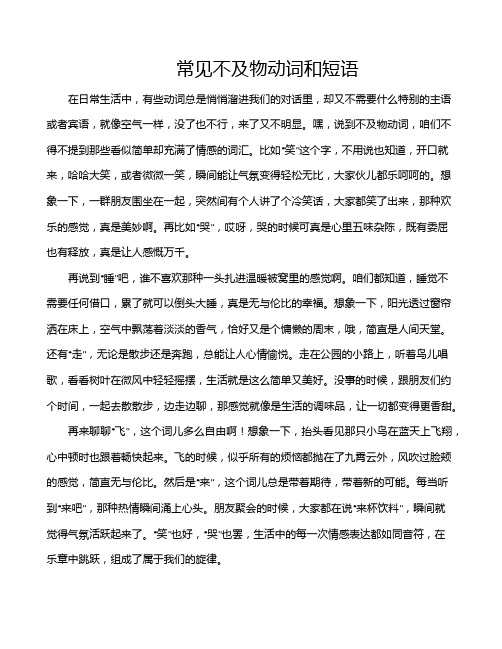
常见不及物动词和短语在日常生活中,有些动词总是悄悄溜进我们的对话里,却又不需要什么特别的主语或者宾语,就像空气一样,没了也不行,来了又不明显。
嘿,说到不及物动词,咱们不得不提到那些看似简单却充满了情感的词汇。
比如“笑”这个字,不用说也知道,开口就来,哈哈大笑,或者微微一笑,瞬间能让气氛变得轻松无比,大家伙儿都乐呵呵的。
想象一下,一群朋友围坐在一起,突然间有个人讲了个冷笑话,大家都笑了出来,那种欢乐的感觉,真是美妙啊。
再比如“哭”,哎呀,哭的时候可真是心里五味杂陈,既有委屈也有释放,真是让人感慨万千。
再说到“睡”吧,谁不喜欢那种一头扎进温暖被窝里的感觉啊。
咱们都知道,睡觉不需要任何借口,累了就可以倒头大睡,真是无与伦比的幸福。
想象一下,阳光透过窗帘洒在床上,空气中飘荡着淡淡的香气,恰好又是个慵懒的周末,哦,简直是人间天堂。
还有“走”,无论是散步还是奔跑,总能让人心情愉悦。
走在公园的小路上,听着鸟儿唱歌,看看树叶在微风中轻轻摇摆,生活就是这么简单又美好。
没事的时候,跟朋友们约个时间,一起去散散步,边走边聊,那感觉就像是生活的调味品,让一切都变得更香甜。
再来聊聊“飞”,这个词儿多么自由啊!想象一下,抬头看见那只小鸟在蓝天上飞翔,心中顿时也跟着畅快起来。
飞的时候,似乎所有的烦恼都抛在了九霄云外,风吹过脸颊的感觉,简直无与伦比。
然后是“来”,这个词儿总是带着期待,带着新的可能。
每当听到“来吧”,那种热情瞬间涌上心头。
朋友聚会的时候,大家都在说“来杯饮料”,瞬间就觉得气氛活跃起来了。
“笑”也好,“哭”也罢,生活中的每一次情感表达都如同音符,在乐章中跳跃,组成了属于我们的旋律。
再说“变”,这个词儿充满了惊喜。
生活就像一条河流,总是在不断变化,有时候平静得像镜子,有时候又波涛汹涌。
变化有时让人害怕,但更多的时候,却是带来了新的机遇和可能。
比如,随着季节的变换,树叶从青翠到金黄,生命的韵律在此刻显得如此动人。
说到这里,不得不提“跑”,真是一项让人又爱又恨的运动。
汉语常见的40个不及物动词
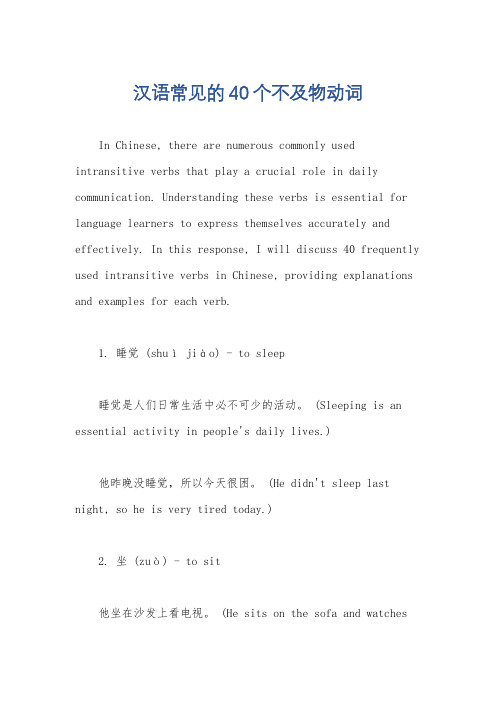
汉语常见的40个不及物动词In Chinese, there are numerous commonly usedintransitive verbs that play a crucial role in daily communication. Understanding these verbs is essential for language learners to express themselves accurately and effectively. In this response, I will discuss 40 frequently used intransitive verbs in Chinese, providing explanations and examples for each verb.1. 睡觉(shuì jiào) - to sleep睡觉是人们日常生活中必不可少的活动。
(Sleeping is an essential activity in people's daily lives.)他昨晚没睡觉,所以今天很困。
(He didn't sleep last night, so he is very tired today.)2. 坐(zuò) - to sit他坐在沙发上看电视。
(He sits on the sofa and watchesTV.)请坐,别客气。
(Please have a seat, don't be polite.)3. 站(zhàn) - to stand他站在门口等着朋友。
(He stands at the door waiting for his friend.)请站起来,让我坐一下。
(Please stand up and let me sit for a moment.)4. 跑(pǎo) - to run他每天早上去公园跑步锻炼身体。
- 1、下载文档前请自行甄别文档内容的完整性,平台不提供额外的编辑、内容补充、找答案等附加服务。
- 2、"仅部分预览"的文档,不可在线预览部分如存在完整性等问题,可反馈申请退款(可完整预览的文档不适用该条件!)。
- 3、如文档侵犯您的权益,请联系客服反馈,我们会尽快为您处理(人工客服工作时间:9:00-18:30)。
常见的不及物动词agree, go, work, listen, look, come, die, belong, fall, exist, rise, arrive, sit, sail, hurry, fail, 常见的及物动词兼不及物动词beatvi.跳动vt. 敲、打;grow vi.生长vt. 种植play vi.玩耍vt. 打(牌、球),演奏smell vi.发出(气味)vt. 嗅ring vi.(电话、铃)响vt.打电话speak vi.讲话vt. 说(语言)hang vi. 悬挂vt. 绞死operate vi.动手术vt. 操作常用的不及物动词appear ,Appear calmcome ,Come easy (safe)go ,Go mad (crazy, bad, sour, wrong, crazy, hungry, blind)get ,Get angry (ill, wet, excited, married, paid)fall ,Fall asleep( fall ill, fall short, fall flat)feel ,Feel good (sleepy)keep ,Keep quiet (silent)look ,Look fit (well, young, tired)make,Make certain (sure, ready, a good teacher) prove ,Prove an effective method (correct, accurate) remain ,Remain still (unchanged)rest,Rest satisfied (content)rise,Rise redseem ,Seem happystand ,Stand stillstay ,Stay young (stay fresh, the same)turn,Turn teacher =become a teacher (yellow)turn out ,Turn out true常见不及物动词搭配1.break down (stop functioning 坏了,不好使了)That old Jeep had a tendency to break down just when I needed it the most.2.catch on (become popular 出名)Popular songs seem to catch on in California first and then spread eastward.3. come back ( return to a place 返回)Father promised that we would never come back to this horrible place.4. come in ( Enter进入)They tried to come in through the back door, but it was locked.e to ( regain consciousness恢复意识)He was hit on the head very hard, but after several minutes, he started to come to again.e over (to visit访问)The children promised to come over, but they never do.7.drop by (visit without appointment 顺便拜访)We used to just drop by, but they were never home, so we stopped doing that.8.eat out (dine in a restaurant 外出吃饭)When we visited Paris, we loved eating out in the sidewalk cafes.9. get by ( survive凑合,过得去)Uncle Heine didn't have much money, but he always seemed to get by without borrowing money from relatives.10.get up ( Arise起床)Grandmother tried to get up, but the couch was too low, and she couldn't make it on her own.11. go back ( return to a place 回到)It's hard to imagine that we will ever go back to Lithuania.12.go on ( Continue继续)He would finish one Dickens novel and then just go on to the next.13. go on (2) ( Happen发生)The cops heard all the noise and stopped to see what was going on.14. grow up ( get older变老)Charles grew up to be a lot like his father.15.keep away ( remain at a distance保持距离)The judge warned the stalker to keep away from his victim's home.16. keep on (+动名称) ( continue with the same继续保持)He tried to keep on singing long after his voice was ruined.17. pass out ( lose consciousness, faint昏过去,晕)He had drunk too much; he passed out on the sidewalk outside the bar.18. show off ( demonstrate haughtily 炫耀)Whenever he sat down at the piano, we knew he was going to show off.19. show up( Arrive到达,出现)Day after day, Efrain showed up for class twenty minutes late.20. wake up (arouse from sleep醒来)I woke up when the rooster crowed.接不定式(而不接动名词)作宾语的24个常用动词afford to do sth. 负担得起做某事agree to do sth. 同意做某事arrange to do sth.安排做某事ask to do sth. 要求做某事beg to do sth. 请求做某事care to do sth. 想要做某事choose to do sth. 决定做某事decide to do sth. 决定做某事demand to do sth. 要求做某事determine to do sth. 决心做某事expect to do sth. 期待做某事fear to do sth. 害怕做某事help to do sth. 帮助做某事hope to do sth. 希望做某事learn to do sth. 学习做某事manage to do sth. 设法做某事offer to do sth. 主动提出做某事plan to do sth. 计划做某事prepare to do sth. 准备做某事pretend to do sth. 假装做某事promise to do sth. 答应做某事refuse to do sth. 拒绝做某事want to do sth. 想要做某事wish to do sth. 希望做某事注:有些不及物动词后习惯上也接不定式,不接动名词:aim to do sth. 打算做某事fail to do sth. 未能做某事long to do sth. 渴望做某事happen to do sth. 碰巧做某事hesitate to do sth. 犹豫做某事struggle to do sth. 努力做某事跟介词搭配的不及物动词count on 依靠embark on上路gamble on以……打赌insist on坚持……rely on依靠theorize on 对……推理,对……建立理论harp on 老提到……calculate on 指望,依靠concentrate on 集中到……depend on依靠reckon on盼望,指望……account for 说明,解释……answer for回答……apologize for为……道歉suffer for为……受苦pay for 为……付钱look for 寻找atone for补偿,赔偿make up for补偿stand for代表compensate for 补偿abstain from 有意回避,弃权desist from 停止refrain from抑制,忍住shrink from 回避suffer from 受苦,患病benefit from 获益于flinch from 退缩escape from 从……逃开approve of 同意boast of 吹牛consist of 由……组成despair of 失望dream of 梦想做某事repent of 忏悔,懊悔believe in 相信……persevere in 坚持……revel in 陶醉,着迷于……succeed in 在某方面成功delight in 为……高兴join in 加入……participate in 参加……persist in 坚持……specialize in 专门从事某事,在某方面专长aim at 瞄准于……chafe at 恼怒,不满frown at 向……皱眉头scowl at 沉下脸……,对……皱眉laugh at 嘲笑smile at向……微笑work at 从事于……,用功于……look at 看着……attend to 参加……certify to 证明……allude to 暗示……confess to 承认……descend to 下降到……object to 反对……react to 对某事作出反应refer to 提到……resort to 求助,采用……see to 检查……submit to 提交……testify to 表明,说明……turn to 转向……fall to 下跌,减弱初一到初三全英语单词表注:n 名词v 动词adj形容词adv 副词prep介词conj 连词phr.短语num数词第一册1----8331 what pron 什么2 is v 是3 what's what is的缩写形式4 your pron 你的,你们的5 name n 名字6 my pron 我的7 I pron 我8 am v 是9 I'm I am的缩写形式10 in prep 在...里(内,上)11 row n (一)排,(一)行12 one num 一13 number n 数字,号码14 two num 二15 too adv 也16 three num 三17 are v 是18 you pron 你,你们19 yes adv 是20 four num 四21 five num 五22 no adv & adj 不,不是23 not adv 不24 hi interj 喂(问候或唤起注意)25 class n (学校里的)班级,年级26 grade n 年级27 six num 六28 seven num 七29 eight num 八30 nine num 九31 ten num 十32 zero num & n 零33 plus prep 加,加上34 it pron 它35 it's it is的缩写形式36 how adv (指程度)多少,怎样37 old adj ...岁的,老的38 eleven num 十一39 twelve num 十二40 minus prep 减,减去41 thirteen num 十三42 fourteen num 十四43 fifteen num 十五44 hello interj 喂(问候或唤起注意)45 please interj 请46 can v.aux 能,可以,会47 spell v 拼写48 that pron 那,那个49 secret n 秘密50 this pron 这,这个51 in prep 用...(表达)52 English n & adj 英语,英国人英国的,英国人的53 in English phr. 用英语(表达)54 a art 一(个,件...)55 clock n 钟56 and conj 和,又,而57 pencil-box n 铅笔盒58 an art 一(个;件.)(用于元音开头的词前)59 pencil n 铅笔60 ruler n 尺子61 pen n 钢笔62 sharpener n 卷笔刀63 eraser n 橡皮擦64 room n 房间65 book n 书66 map n 地图67 desk n 书桌68 cup n 杯子69 bag n 书包70 computer n 电脑,电子计算机71 mouse n 鼠,耗子,鼠标72 bed n 床73 keyboard n 键盘74 isn't is not的缩写形式75 pear n 梨76 cake n 蛋糕,饼,糕77 banana n 香蕉78 apple n 苹果79 orange n 橙子,橘子80 egg n 蛋81 bike n 自行车82 bus n 公共汽车。
